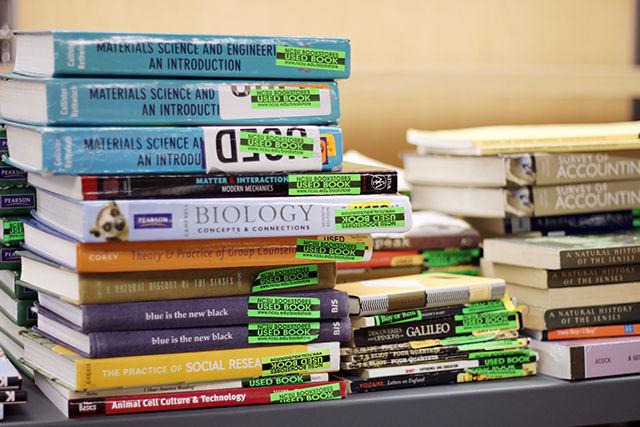The start of the semester is marked by students trying to find the best deals on books they can find. NC State Bookstores and University Libraries have several options for students to access textbooks in the format and price they want.
At NC State Bookstores, students have the option to purchase textbooks. Anthony Sanders, associate director of NC State Bookstores, said the bookstores offer the best prices they can to students by finding digital alternatives and price comparison shopping. He said digital textbooks have gained increasing popularity over the past few years.
“Within the past few years, we’ve really transitioned a lot towards digital course materials,” Sanders said. “I think part of it was the pandemic, as well as remote learning to transition to [more] digital course material content, which in almost every case is significantly less expensive than a print counterpart … So it’s really a majority of what we’re delivering to students right now.”
Sanders said students also enjoy getting instant access to their textbooks when purchasing digital. According to Sanders, for classes where digital books are not available, the bookstores offer new and used books with price comparisons and links to make shopping easier.
“We provide a lot of used books as well,” Sanders said. “For those titles that don’t have digital matches, we try to source content from different wholesalers to get those as cheaply as possible and pass that savings on to students. We provide price comparison shopping … so students can price comparison shop and try and get the best deal from whatever vendor whether it’s us or someone else.”
The bookstores also collaborate with University Libraries to provide students with access to textbooks. David Tully, librarian for student success and affordability at University Libraries, works with faculty at the libraries to come up with free alternatives to students buying commercial textbooks. Tully said the libraries textbook lending program is the main way the libraries offer alternatives to buying textbooks.
According to Tully, the libraries have offered a textbook lending program for over 10 years.
“So that is, we reserve every required textbook,” Tully said. “The libraries will purchase at least one copy of it and make it available on reserve at our libraries.”
Tully said students can also access some textbooks as e-books through the libraries’ online catalog or their textbooks page but, due to e-books having different licensing requirements, not all books can be accessed this way.
“Some will have unlimited users at one time,” Tully said. “Others will only allow one person per time. It’s different per title [and] depends upon the publisher … So as such, 75% of required texts will be available at the libraries in print. And then we have a growing collection of e-book textbook titles as well.”
Tully said students utilizing the textbook lending program should consider learning to use the book scanners found around the libraries. The loan program only allows books to be checked out for two hours. By using the scanner, students can extend the amount of time they can look at material by creating a copy for themselves.
“My main tip is we have these really fantastic overhead book scanners available at all of our libraries,” Tully said. “So if you borrow this book, and you’re not going to read it there and you want to refer back to it, and maybe you don’t want to come back to the libraries again for a while, we have these overhead book scanners, so you can digitize chapters and maintain a permanent copy of them.”
By using the scanners, students can save scans of a textbook to their Google Drive, a flash drive or as a PDF. Tully said the beginning of the semester is the best time to do this.
“We find that in terms of checkouts and everything else it gets busier as the semester sort of develops,” Tully said. “The first few weeks are a little bit more quiet, so that is the optimal time to come in, you have the greatest chance of finding your book available. And then, using those digital scanners, you can save those chapters and it’s yours for eternity, or at least a semester or however long you want to use them.”
Tully said students can also opt to borrow older editions of books from the libraries if the updated information isn’t pertinent to a professor’s teaching. If a title isn’t already available through the libraries, students can put in a request for the book through the Tripsaver program, and the libraries will try to make the book available.
To find your textbooks, check out the bookstores and libraries websites.













